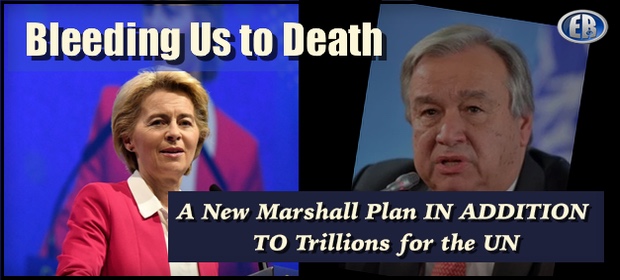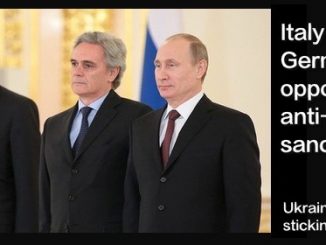
ER Editor: And that wartime metaphor we keep hearing (Macron – ‘nous sommes en guerre‘ / we’re at war) is the gift that keeps on giving. Now it’s a costly new Marshall Plan to be borne by taxpayers. And what happened to the massive taxes to be imposed on us, to raise 3 TRILLION euros over 10 years, for the fake climate nonsense? See this from December 4, last year: EU Parliament Declares Climate Emergency [VIDEO] at Colossal Cost to Taxpayers.
Has the COVID non-pandemic become the new justification for extortion of taxpayers?
Will this be covering the massive cost of those new vaccines planned for us, that we won’t need, yet our governments will be obliged to buy from Big Pharma and Bill Gates anyway?
We remind readers of a piece we recently published titled UN Wants a 10% Global Tax of Several Trillions to Fight ‘Pandemic’. To be clear, the UN wants our taxes to rise and now so does the EU for those particular countries involved. With engineered mass unemployment, who is going to be able to pay for this? We remind readers of economist Dr. Antony Mueller’s piece, aptly titled How Gullible Politicians Promoted Global Economic Destruction and Threw Us into the Abyss of Serfdom.
Serfdom. It’s becoming pretty clear this is all by design.
********
Wartime Budget? EU Leaders Claim Europe Needs New ‘Marshall Plan’ to Be Saved Amid Pandemic
SPUTNIK NEWS
The Marshall Plan was a $12 billion (over $120 billion in today’s value) aid package sent from the US to certain European countries in a bid to support rebuilding the continent after the end of the Second World War. Despite generally believed to have been successful, its actual impact on Europe’s restoration is still debated among historians.
President of the European Commission Ursula von der Leyen has called on members of the bloc to invest heavily in the EU budget, claiming that the union requires a Marshall Plan to save its member states amid the coronavirus pandemic, in an apparent reference to financial aid that was extended to several European countries by the US back in 1948.
“The many billions that have to be invested today to avert a greater catastrophe will bind the generations together”, she wrote in an editorial for the German newspaper Welt am Sonntag.
Spanish Prime Minister Pedro Sanchez, whose country has been suffering greatly due to the COVID-19 infection, also called for a new Marshall Plan for Europe in a separate op-ed in another German newspaper, Frankfurter Allgemeine Zeitung. Sanchez went even further by suggesting that the EU requires a special budget akin to one adopted during times of war.
“Europe has to establish a wartime economy and put in place measures for the defense, the reconstruction and the economic recovery of Europe”, the prime minister suggested.
Sanchez believes that if decisive action is taken to fight the coronavirus-induced crisis, the EU will emerge from it in “much stronger” shape.
The calls of the two politicians have already sparked reactions, with the minister for European affairs for Hessen in Germany, Lucia Puttrich, slamming the initiative. She suggested that those who demand “more billions for the European budget” effectively want to reduce the amount of so-called net contributing member states – the EU countries that pay more to bloc’s budget than others in an effort to boost weaker European economies.
Unlike the original Marshall Plan, where the US provided money to rebuild European economies after the end of the Second World War mostly in the form of grants, the money for von der Leyen’s plan is supposed to come from EU member states themselves. Additionally, while the original Marshall Plan is believed to have sped up the post-war recovery of the recipient states, historians still debate to which extent the plan itself should be credited with rate of the recovery.
************
Original article

••••
The Liberty Beacon Project is now expanding at a near exponential rate, and for this we are grateful and excited! But we must also be practical. For 7 years we have not asked for any donations, and have built this project with our own funds as we grew. We are now experiencing ever increasing growing pains due to the large number of websites and projects we represent. So we have just installed donation buttons on our websites and ask that you consider this when you visit them. Nothing is too small. We thank you for all your support and your considerations … (TLB)
••••
Comment Policy: As a privately owned web site, we reserve the right to remove comments that contain spam, advertising, vulgarity, threats of violence, racism, or personal/abusive attacks on other users. This also applies to trolling, the use of more than one alias, or just intentional mischief. Enforcement of this policy is at the discretion of this websites administrators. Repeat offenders may be blocked or permanently banned without prior warning.
••••
Disclaimer: TLB websites contain copyrighted material the use of which has not always been specifically authorized by the copyright owner. We are making such material available to our readers under the provisions of “fair use” in an effort to advance a better understanding of political, health, economic and social issues. The material on this site is distributed without profit to those who have expressed a prior interest in receiving it for research and educational purposes. If you wish to use copyrighted material for purposes other than “fair use” you must request permission from the copyright owner.
••••
Disclaimer: The information and opinions shared are for informational purposes only including, but not limited to, text, graphics, images and other material are not intended as medical advice or instruction. Nothing mentioned is intended to be a substitute for professional medical advice, diagnosis or treatment.




